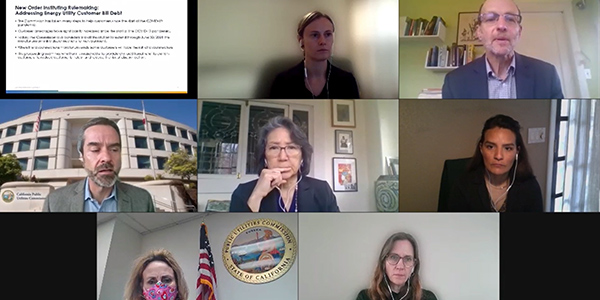The California Public Utilities Commission is seeking ways to help the millions of utility customers who collectively owe more than $1.15 billion in past-due energy bills, largely because of the COVID-19 pandemic and resulting economic downturn.
The commission continued a moratorium on customers disconnections through June. But without additional action, utility customers eventually will be on the hook for the arrearages, it said in issuing a new order instituting rulemaking (OIR).
“We need to get started preparing our customers through what’s going to be a very, very difficult transition period,” Commissioner Clifford Rechtschaffen said. “Those numbers are extraordinarily frightening: the [amount and] extent of the debt owed — really, really jarring.”
Ed Randolph, head of the CPUC’s Energy Division, said he is fairly certain about the amount owed, but the exact number of customers in arrears is harder to determine because of the different ways utilities report them.
Pacific Gas and Electric, the state’s largest utility, said its customers owe it more than $531 million. Southern California Edison said its ratepayer debts total close to $332 million. San Diego Gas & Electric recorded more than $142 million in past-due bills, while Southern California Gas racked up nearly $149 million in customer debt.
Job losses contributed heavily to the debt. Unemployment for low-income households in California topped 30% during part of 2020, the commission noted.
The proposed decision adopted Thursday starts a process of trying to find “relief mechanisms” for customers and utilities alike.
“When the disconnection moratorium ends, some customers will be faced with outstanding utility bills,” the commission said. “When disconnections for nonpayment resume, some households will still be contending with loss of life and livelihood, and we do not intend for these customers to face their outstanding utility bill arrearages alone.”
Another concern is the financial stability of the investor-owned utilities, the CPUC said.
“The pandemic has persisted longer than could have been imagined,” it said. “Increases in unpaid customer bills may also impact the financial health of the very utilities that must continue to provide the essential services.”
The commission said it does not want to spread the backlogged debts among all IOU customers, as normally might be done. Instead, it is considering programs to provide payment assistance to vulnerable customers, including medical baseline customers, and to introduce longer and more flexible payment options for customers who cannot pay on time.
“Our new proceeding will put in place debt management programs tailored to these extremely challenging times, with special consideration for the most vulnerable in our communities who may be having trouble paying their energy bills,” Rechtschaffen said in a statement following the vote.





